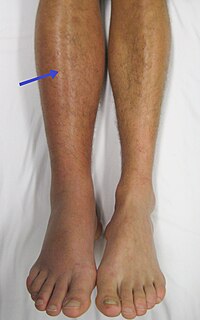
Photo from wikipedia
Unexplained recurrent pregnancy loss (uRPL) is a clinical condition for which there is a lack of evidenced-based therapies. However, in clinical practice, low molecular weight heparin (LMWH) has been widely… Click to show full abstract
Unexplained recurrent pregnancy loss (uRPL) is a clinical condition for which there is a lack of evidenced-based therapies. However, in clinical practice, low molecular weight heparin (LMWH) has been widely used as an empirical therapy since immune effects have been hypothesized in modulating immune tolerance at the fetal-maternal interface. Epigenetic mechanisms are involved in establishing of immune tolerance, at fetal-maternal interface. To investigate potential induced immune-epigenetic changes at maternal periphery level, which could reflect the maternal-fetal interface condition, seems to open up new therapeutical strategies, since microRNAs circulating in maternal plasma and in peripheral blood mononuclear cells (PBMCs) may be specific and sensitive immunological markers/predictors of adverse pregnancy outcomes such as RPL. Our aim in this pilot study is to evaluate potential LMWH effects on genes regulating immunological response key mechanisms related to maternal-fetal tolerance processes, by studying circulating miRNAs in maternal peripheral blood. We tested a panel of selected miRNAs on three groups: 18 healthy pregnant women, 20 pregnant women affected by uRPL, 18 pregnant women affected by uRPL, treated with LMWH. The majority of differentially expressed miRNAs (miR 374a-5p, 19a-3p, 30e-5p, 128-3p, 155-5p and 200c-3p) were found to be modulated by LMWH, which seems to have a positive function in RPL patients, by bringing patients' values back to those comparable to the control ones. Selected microRNA panels would appear to be an effective clinical tool for uRPL diagnosis and management. LMWH-modified miRNA expression levels could be targets for immunotherapy, as LMWH would appear to restore physiological miRNA levels, which are dysregulated in uRPL.
Journal Title: Journal of reproductive immunology
Year Published: 2022
Link to full text (if available)
Share on Social Media: Sign Up to like & get
recommendations!